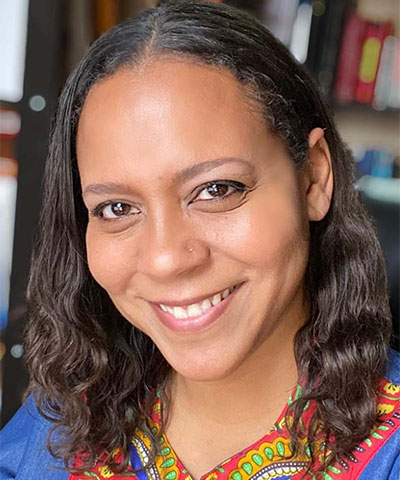
Stefanie K. Dunning
Susan B. Anthony Professor
Professor of Black Studies
Professor of English
Director, Sexuality, Women, and Gender Studies
PhD, University of California, Riverside
- Office Location
- 538 Lattimore Hall
- Telephone
- (585) 275-5115
Biography
Stefanie K. Dunning (she/her and they/them) is Professor of Black Studies and English at the University of Rochester and the Director of the Susan B. Anthony Institute for Gender, Women, and Sexuality Studies. Dunning is the author of Queer in Black and White: Interracial and Same Sex Desire in African American Culture (Indiana, 2009) and Black to Nature: Pastoral Return and African American Culture (Mississippi, 2021) and has written numerous articles in journals and anthologies, from MELUS, African American Review, Studies in the Fantastic, and others. Dunning earned her BA in English from Spelman College and a PhD in English from the University of California, Riverside.
Dunning’s work has been supported by a Ford Foundation Predoctoral Fellowship, and during Dunning’s tenure at Miami University of Ohio, Dunning received several honors including being selected as a co-fellow of the Humanities Center program on Race and Racism, several teaching awards, and numerous teaching commendations. In 2005, Dunning was awarded the prize for the best 20th century literature essay of the year in African American Review. Dunning has also been featured on several podcasts, including Conversations in Atlantic Theory and A Correction: A podcast. Dunning also produces a podcast called Black to Nature: The podcast which is available on all major platforms.
Research Overview
Dunning’s research focuses on African American literature, speculative fiction, Black ecologies, queer theory, and film and visual culture, and Black feminist theory.
Research Interests
- Black ecologies
- Queer ecologies
- Queer theory
- Black feminist theory
- African American literature
- Literary and cultural studies
- Film and visual cultures
Selected Publications
Books
- Other/World(ly): A Black Ecology of Outer Space (Work-in-Progress)
- Black to Nature: Pastoral Return and African American Culture. Jackson: The University Press of Mississippi, April 2021.
- Queer in Black and White: Interraciality, Same Sex Desire, and African American Culture. Terre Haute: Indiana University Press, 2009. Reviewed in MELUS, Black Camera, Feminist Review, and American Literature.
Journal Articles and Book Chapters
- “Other/World(ly): A Black Ecology of Outer Space,” Space and Literary Studies, edited by Elizabeth Evans, Cambridge, England: Cambridge University Press, Forthcoming 2024.
- “What is the Future? Weirdness and Black Time in Sorry to Bother You.” Studies in the Fantastic, vol. 9, Summer 2020, pp. 44-62.
- "Learn or Die": Survival and Anarchy in Octavia Butler's Parable of the Sower.” Human Contradictions in Octavia E. Butler’s Work, edited by Martin Japtok and Jerry Rafiki Jenkins, Palgrave-MacMillan, 2020, pp. 179-194.
- "Introducing Multiple Readings of Ralph Ellison’s Invisible Man in the Classroom." Teaching (Con)Texts: Frameworks for Engaging Culture and Craft in American Literatures, edited by Helane Androne, McFarland, 2014, pp. 15-28.
- “The Wounded City: Ambiguous Subjectivities and the Riotous Metropolis in Samuel Delany’s Dhalgren.” The Idea of the City: Early-Modern and Post-Modern Locations and Communities, edited by Joan Fitzpatrick, Cambridge Scholars, 2009, pp. 193–202.
- “Ironic Soil: Recuperative Rhythms and Negotiated Nationalism.” African American Review, vol. 39, nos. 1-2, Spring/Summer 2005, pp. 231-243.
- “The Unripened Heart.” Best Lesbian Love Stories of 2005, edited by Angela Brown, Alyson Books, 2005, pp. 34-51.
- “Brown Like Me: An Essay of Shifting Ideology.” Mixing It Up, edited by SanSan Kwan and Kenneth Spears, University of Texas Press, 2004, pp. 123-141.
- “Parallel Perversions: Interracial and Same Sexuality in James Baldwin’s Another Country.” MELUS, vol. 26, no. 2, Winter 2001, pp. 95-115.
- “Vegetarianism without Self-righteousness: The Politics of ‘Consciousness’ and Cultural Identity.” Black Renaissance/Renaissance Noire, vol. 2, no. 3, Winter 1999, pp. 144-152.
- “Demystifying the Tragic Mulatta: The Biracial Woman as Spectacle.” Stanford Black Arts Quarterly vol. 2, no. 3, Summer/Spring 1997, pp. 12-14.
